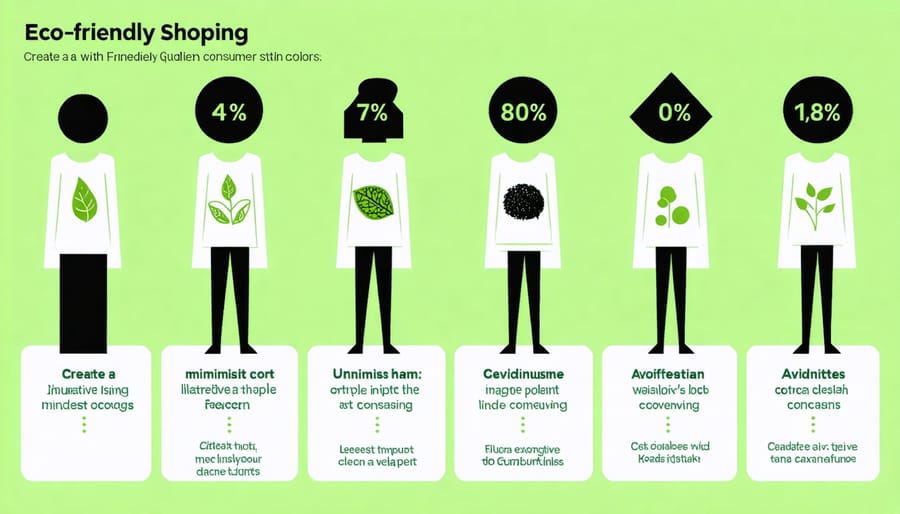Consumer purchasing decisions are deeply rooted in cultural influences, shaping everything from daily essentials to luxury investments in the Canadian marketplace. Recent market research reveals that 78% of Canadian consumers make buying choices based on their cultural values, traditions, and social environment. This powerful cultural impact extends beyond personal preferences, creating market trends that savvy businesses can leverage for strategic growth.
Understanding these cultural dynamics has become critical for Canadian businesses, particularly as our multicultural society continues to evolve. From the surge in plant-based products reflecting environmental consciousness to the growing demand for locally-sourced goods supporting community values, cultural influences drive significant market shifts. Toronto-based retail analyst Sarah Chen notes, “Companies that successfully align their offerings with cultural values consistently outperform those that don’t by 35% in customer retention.”
The intersection of technology and traditional values has created a unique landscape where consumers increasingly seek products that reflect both their heritage and modern lifestyle aspirations. This cultural fusion presents unprecedented opportunities for businesses that can effectively decode and respond to these complex consumer motivations.
As we examine the role of cultural influences in consumer behavior, we’ll explore how successful Canadian businesses are adapting their strategies to meet these evolving cultural demands while maintaining authentic connections with their target markets.
Digital Culture’s Impact on Canadian Shopping Habits
The Rise of Social Commerce
Social media platforms have revolutionized how digital platforms influence consumer decisions, particularly in Canada’s dynamic marketplace. Instagram and TikTok have emerged as powerful forces driving purchase behavior, with 72% of Canadian consumers reporting that they’ve made purchases based on social media recommendations.
Canadian retailers like Shopify have capitalized on this trend by integrating social commerce features that enable direct purchases through social platforms. The success of Montreal-based fashion brand SSENSE demonstrates how social media can transform traditional retail, with their Instagram-first strategy generating over 60% of their online sales.
TikTok’s impact has been particularly significant, with Canadian businesses reporting a 300% increase in conversion rates through TikTok Shop compared to traditional e-commerce channels. The platform’s authentic content creation and peer recommendations have created a new paradigm in social selling.
Industry experts predict that social commerce will continue to grow, with live shopping events and influencer collaborations becoming standard practice for Canadian retailers seeking to engage digitally-savvy consumers.
Influencer Marketing in Canada
In recent years, influencer marketing has become a powerful force shaping Canadian consumer behavior, with 71% of Canadians following social media influencers and making purchase decisions based on their recommendations. Notable Canadian influencers like Lilly Singh and Catherine Belknap have demonstrated significant impact on consumer choices across fashion, lifestyle, and technology sectors.
Canadian businesses are increasingly allocating marketing budgets to influencer partnerships, with the industry growing by 25% annually since 2020. Studies by the Canadian Marketing Association show that authenticity and cultural relevance are key factors driving successful influencer campaigns in Canada’s diverse market.
Quebec-based beauty brand Laboratoire Dr Renaud saw a 40% increase in sales after partnering with local micro-influencers who understood the province’s unique cultural nuances. Similarly, Vancouver-based athleisure companies have reported substantial growth through collaborations with health and wellness influencers who reflect Canadian outdoor lifestyle values.
Marketing experts suggest that Canadian consumers are particularly responsive to influencers who demonstrate environmental consciousness and social responsibility, reflecting broader cultural values. This trend has led to the emergence of sustainability-focused content creators who significantly impact eco-friendly purchase decisions.

Sustainability: A Cultural Shift in Canadian Consumer Behavior

Eco-Friendly Product Preferences
Canadian consumers increasingly demonstrate how sustainability drives purchasing decisions, reflecting a significant cultural shift toward environmental consciousness. Recent market research indicates that 73% of Canadian consumers actively seek eco-friendly products, with millennials leading this cultural transformation.
This preference extends across various sectors, from food and beverage to fashion and home goods. Canadian retailers like MEC and Lululemon have successfully adapted their product lines to meet this growing demand, incorporating recycled materials and sustainable manufacturing practices into their core business strategies.
The trend is particularly evident in urban centers like Vancouver and Toronto, where consumers are willing to pay a premium of 15-20% for environmentally responsible products. This cultural shift has prompted both established brands and startups to reimagine their product offerings, with many Canadian companies developing innovative sustainable alternatives to traditional products.
Local success stories include Vancouver-based ChopValue, which transforms used chopsticks into furniture, demonstrating how sustainability-focused business models can effectively respond to evolving cultural values while creating market opportunities.
Local Business Support Movement
Recent studies show that Canadian consumers are increasingly prioritizing local businesses in their purchasing decisions, driven by a growing awareness of community economic impact. This cultural shift has accelerated since 2020, with 65% of Canadians now actively seeking locally-produced goods and services. The movement has contributed to sustainable business growth across various sectors, particularly in food, artisanal products, and professional services.
The “shop local” mentality has become deeply embedded in Canadian consumer culture, influenced by social media campaigns, community initiatives, and government support programs. Local business directories and farmer’s markets have seen substantial growth, with major cities reporting a 40% increase in local market participation since 2019.
This cultural trend reflects broader values of community support and economic resilience. According to the Canadian Federation of Independent Business, consumers are willing to pay up to 10% more for locally-sourced products, demonstrating a strong emotional connection to supporting neighborhood enterprises. This shift has prompted larger corporations to emphasize their local connections and community involvement in marketing strategies.
Health and Wellness Trends

Plant-Based Product Surge
The surge in plant-based products across Canadian markets reflects a significant cultural shift in consumer values and eating habits. Market research indicates a 40% year-over-year growth in plant-based food sales, with major Canadian retailers expanding their vegetarian and vegan offerings to meet increasing demand.
Leading Canadian brands like Maple Leaf Foods have invested heavily in plant-based product lines, recognizing the cultural momentum behind meat alternatives. Their subsidiary, Greenleaf Foods, has captured substantial market share by aligning with environmental and health-conscious consumer values.
This trend is particularly strong among millennials and Gen Z consumers, who are driving the adoption of plant-based alternatives through social media influence and peer recommendations. According to the Canadian Plant-Based Food Association, 40% of Canadians are actively incorporating more plant-based products into their diets.
Restaurant chains across Canada have responded by introducing plant-based menu items, while local manufacturers are innovating with Canadian-grown ingredients like pea protein and oats. This cultural shift has created opportunities for entrepreneurs to develop products that cater to both ethical and health-conscious consumers while supporting sustainable agriculture practices.
Fitness and Wellness Technology
The rising health consciousness among Canadians has led to a significant surge in fitness and wellness technology purchases. Market data shows that spending on fitness trackers, smart watches, and health monitoring devices has increased by 45% since 2020. This trend reflects a cultural shift towards preventive healthcare and personal wellness management.
Canadian consumers are particularly drawn to devices that offer comprehensive health monitoring features, with sleep tracking and stress management capabilities being top priorities. According to the Canadian Wellness Association, 68% of urban professionals now use at least one form of wellness technology in their daily routines.
Local retailers like Sport Chek and Best Buy Canada report that wellness technology sales have outpaced traditional fitness equipment, indicating a strong cultural preference for digital health solutions. The integration of these devices with healthcare apps and services has further accelerated adoption rates, especially among millennials and Gen X consumers.
This cultural emphasis on tech-enabled wellness has also sparked innovation within Canadian startups, with companies like Toronto-based Carrot Rewards pioneering incentive-based wellness programs that combine technology with health promotion.
Leveraging Cultural Trends for Business Growth
To effectively capitalize on cultural influences, businesses must develop strategies that align with evolving consumer values and behaviors. Canadian companies that excel at winning customer loyalty understand that cultural trends shape purchasing decisions and brand preferences.
Start by conducting thorough market research to identify dominant cultural values in your target demographic. This includes analyzing social media conversations, consumer feedback, and industry reports to spot emerging trends. For example, Tim Hortons successfully leveraged Canada’s hockey culture to create emotional connections with customers through their “Timbits Hockey” program.
Create authentic connections by aligning your brand with cultural movements that resonate with your audience. Lululemon exemplifies this approach by tapping into the wellness culture, extending beyond athletic wear to become a lifestyle brand that represents health-conscious living and community engagement.
Consider these practical strategies:
1. Develop culturally relevant products and services
– Customize offerings to reflect local preferences
– Incorporate cultural elements into product design
– Address specific cultural needs or pain points
2. Adapt marketing communications
– Use culturally appropriate messaging
– Feature diverse representation in advertising
– Participate in cultural events and celebrations
3. Build community partnerships
– Collaborate with cultural organizations
– Support local initiatives
– Create platforms for cultural expression
4. Embrace digital transformation
– Utilize social media platforms popular within target cultural groups
– Create content that reflects cultural values
– Enable cultural sharing through technology
Monitor cultural shifts continuously and be prepared to pivot strategies as needed. Successful businesses maintain flexibility while staying true to their core values. Remember that cultural influence on consumer behavior is dynamic, requiring ongoing adaptation and authentic engagement.
For maximum impact:
– Train staff in cultural awareness
– Seek feedback from cultural community leaders
– Measure the effectiveness of cultural initiatives
– Adjust strategies based on performance metrics
By implementing these approaches thoughtfully, businesses can create lasting connections with consumers while driving sustainable growth through cultural alignment.
Understanding cultural influences on consumer purchases has become increasingly crucial for Canadian businesses in today’s diverse marketplace. The evidence clearly shows that cultural factors significantly shape buying decisions across all sectors, from food and fashion to technology and entertainment. Canadian companies that have successfully adapted their strategies to reflect cultural sensitivities have seen remarkable growth in market share and customer loyalty.
Looking ahead, the importance of cultural influences in consumer behavior will only intensify as Canada’s population becomes more diverse and globally connected. Businesses that invest in cultural intelligence and adapt their offerings accordingly will be better positioned to capture emerging market opportunities. This includes understanding not only traditional cultural values but also evolving cultural trends driven by social media, environmental consciousness, and changing demographics.
For Canadian business owners and marketers, the key takeaway is clear: success in today’s market requires a deep understanding of cultural influences and the ability to respond authentically to diverse consumer needs. This means investing in market research, engaging with different cultural communities, and developing culturally relevant products and marketing strategies.
The future of consumer behavior will continue to be shaped by the intersection of traditional cultural values and modern influences. Businesses that embrace this reality and adapt their approaches accordingly will find themselves well-positioned for sustainable growth in Canada’s evolving marketplace.
